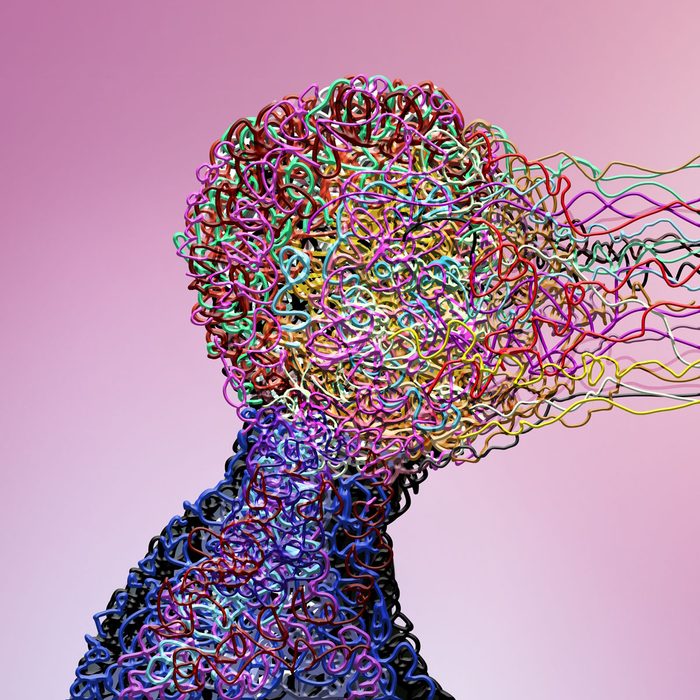Can Depression Cause Memory Loss? A Neurology Expert Explains
Updated: Dec. 23, 2023

Depression causes sadness, fatigue and lack of interest in things that otherwise bring us joy. But can depression cause memory loss, too?
Of all the symptoms depression can cause, you may not expect memory loss to be one of them—but according to the Mayo Clinic memory issues related to mental health can be a serious concern. Though the Mayo Clinic says this forgetfulness is often just temporary, it’s still important to identify its cause and treat it properly.
Get The Healthy @Reader’s Digest newsletter
Can depression impact your memory?
A 2018 study published in Trends in Neurosciences detailed depression’s impacts on memory. If you’re depressed, you may have a hard time recollecting information. You may have better memory of negative things, but difficulty recalling positive ones. These impairments can be distressing; and if they occur, can be a sign your depression is more severe. They can also amp up your anxiety, according to Harvard Medical School, which can further affect your memory.
Authors of the study said memory disruptions during depression are a result of the chronic stress that can trigger depression and affect brain function. Memory interruptions do go away as the depression wanes, though, so it won’t cause permanent brain damage.
Another 2018 report published in Psychological Medicine found that you may struggle to remember details of your life history if you’re depressed. That same study explains that depressive symptoms aren’t linked with standard memory performance. Instead, they’re linked to poorer memory through a lens of negative context. In other words, you’ll retain negative memories more easily than positive memories because of the brain changes depression produces—a notion that’s repeated in a lot of the research on depression-related memory impairments.
Feeling Depressed? Change This One Common Habit, Says New Study
How depression causes memory loss
Though extensive research has established the link between depression and memory issues, researchers are still trying to figure out how, exactly, depression causes memory loss.
Andrew E. Budson, MD, a neurology professor at Boston University School of Medicine and chief of cognitive and behavioral neurology at the VA Boston Healthcare System, tells The Healthy @Reader’s Digest that because depression changes your brain physically, memory loss can be one consequence.
“Depression causes both biochemical changes in the brain and rumination about sad thoughts. Both of these changes impair attention which, in turn, disrupts the ability to learn new information and the ability to retrieve prior information,” Dr. Budson says.
However, he adds, it’s not all bad news: “These reductions in attention and memory are temporary; they will resolve when the depression resolves.”
Here Are 9 Clever Memory Exercises to Start Doing Today
What to do about depression-related memory loss
If you think you’re having memory issues related to depression, it’s important to talk to your doctor or see a specialist to help you identify exactly what you’re dealing with and develop a treatment plan.
“Try to treat the depression either with help from their doctor or through the usual non-pharmacological treatments of depression,” Dr. Budson advises.
There is hope for treating depression-related memory loss. A 2023 study published in peer-reviewed journal PLOS ONE found that a type of meditation focused on kindness and self-compassion helped depressed people improve their memory recall compared to those who didn’t engage in the meditation.
Deepak Chopra’s #1 Meditation for Happiness
Research published in The Lancet Psychiatry in 2016 shows that persistent depression later in life is a good predictor of dementia risk. Older memories are most impaired from depression-related memory loss, Dr. Budson notes. In Alzheimer’s disease, it is the recent memories that are most impaired, he adds.
This is why knowing what you’re dealing with is so important. If your memory loss is from depression, you can treat the symptoms of depression. If your doctor suspects something else is going on, they can help you pinpoint the cause of memory loss. Remember, not all memory loss is permanent and it can be reversible—especially if depression brings it on.
- Sleeping for This Long Each Night May Reduce Heart Disease Risk, Says New Study
- Actor Rainn Wilson Opens Up About Mental Health, Spirituality and His Climate Change Crusade
- The 5 Biggest Beliefs About Getting Alzheimer’s That Aren’t True, a Gerontologist Says
- New Study: Couples Need These 5 Traits in Common for a Relationship To Last
















